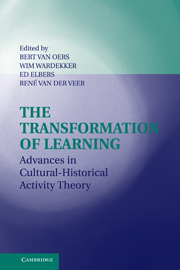Book contents
- Frontmatter
- Contents
- List of Contributors
- Preface
- INTRODUCTION
- SECTION ONE TENETS OF ACTIVITY THEORY
- Introduction to Section One: Exploring Vygotsky's Legacy: The Meaning of Mediation
- 2 Multiple Readings of Vygotsky
- 3 Exploring the Links between External and Internal Activity from a Cultural-Historical Perspective
- 4 Reflections on Points of Departure in the Development of Sociocultural and Activity Theory
- 5 Language in Cultural-Historical Perspective
- 6 The Formation Experiment in the Age of Hypermedia and Distance Learning
- 7 Constructivism and Meaning Construction
- 8 Subject, Subjectivity, and Development in Cultural-Historical Psychology
- SECTION TWO IDENTITY, DIVERSITY, AND INCLUSION
- SECTION THREE DYNAMICS OF ACTIVITY AND THE VARIATIONS OF LEARNING
- Index
- References
2 - Multiple Readings of Vygotsky
Published online by Cambridge University Press: 25 August 2009
- Frontmatter
- Contents
- List of Contributors
- Preface
- INTRODUCTION
- SECTION ONE TENETS OF ACTIVITY THEORY
- Introduction to Section One: Exploring Vygotsky's Legacy: The Meaning of Mediation
- 2 Multiple Readings of Vygotsky
- 3 Exploring the Links between External and Internal Activity from a Cultural-Historical Perspective
- 4 Reflections on Points of Departure in the Development of Sociocultural and Activity Theory
- 5 Language in Cultural-Historical Perspective
- 6 The Formation Experiment in the Age of Hypermedia and Distance Learning
- 7 Constructivism and Meaning Construction
- 8 Subject, Subjectivity, and Development in Cultural-Historical Psychology
- SECTION TWO IDENTITY, DIVERSITY, AND INCLUSION
- SECTION THREE DYNAMICS OF ACTIVITY AND THE VARIATIONS OF LEARNING
- Index
- References
Summary
Vygotsky's work has prompted several interpretations. Older theories naturally spark a range of interpretations, especially if the work of an investigator is sufficiently rich. After all, the reading of historic works is inevitably done on the basis of present-day and personal knowledge and possibly with an eye to the future. As our knowledge is constantly changing, so will our interpretations of the writings of the classic scholar whose work we are studying. In this sense, the need to restudy historic works may perhaps be compared to the need to regularly retranslate classic novels to adjust them to the newest standards. The older translations are no longer acceptable in light of the current knowledge and language. Another way to look at this phenomenon is to consider the process of creating new interpretations and new translations of classic works in terms of Piaget's concepts of assimilation and accommodation, where both the reader and the text will always be transformed in the reading process (van der Veer, 1999a).
Among the older interpretations of Vygotsky's work, I would like to mention the analyses by Wertsch (1985), Cole and colleagues (1978), the younger Leontiev (1990), Tulviste (1991), Yaroshevsky (1989, 1993), Kozulin (1990), and Puzyrej (1986). Interesting newer interpretations have been advanced by, again, Cole (1996), Veresov (1999), and Toomela (2000). Each of these scholars emphasizes different aspects of Vygotsky's work and creates, as it were, his own Vygotsky. But these were only the interpretations of Vygotsky's work published in English or Russian.
Information
- Type
- Chapter
- Information
- The Transformation of LearningAdvances in Cultural-Historical Activity Theory, pp. 20 - 37Publisher: Cambridge University PressPrint publication year: 2008
References
Accessibility standard: Unknown
Why this information is here
This section outlines the accessibility features of this content - including support for screen readers, full keyboard navigation and high-contrast display options. This may not be relevant for you.Accessibility Information
- 7
- Cited by
